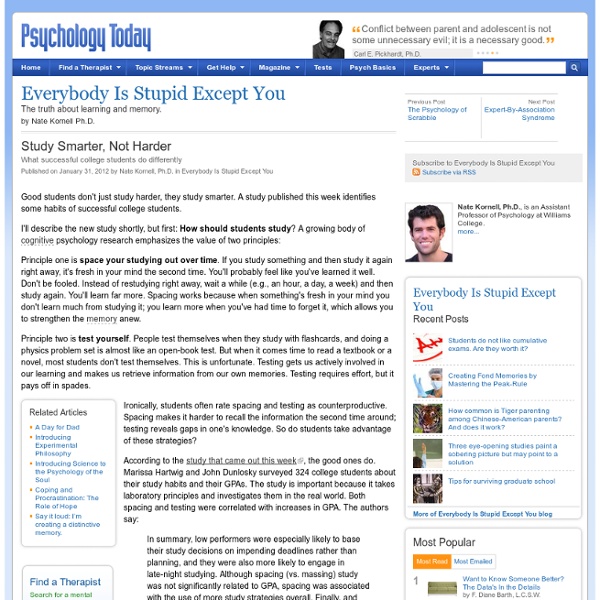Reading Strategies - Learning Skills from MindTools
Reading Efficiently by Reading Intelligently Get the most from your reading. © iStockphoto/mammamaart Whether they're project documents, trade journals, blogs, business books or ebooks, most of us read regularly as part of our jobs, and to develop our skills and knowledge. But do you ever read what should be a useful document, yet fail to gain any helpful information from it? In this article, we're looking at strategies that will help you read more effectively. Think About What You Want to Know Before you start reading anything, ask yourself why you're reading it. Once you know your purpose, you can examine the resource to see whether it's going to help you. For example, with a book, an easy way of doing this is to look at the introduction and the chapter headings. Ask yourself whether the resource meets your needs, and try to work out if it will give you the right amount of knowledge. Know How Deeply to Study the Material Read Actively Tip: Know How to Study Different Types of Material Tip 1:
Simple Ways To Study Better
Knowledge is the essence of smart thinking. No matter how much raw intelligence you have, you are not going to succeed at solving complex problems without knowing a lot. That's why we spend the first 20 (or more) years of our lives in school. Robert Bjork and fellow PT blogger Nate Kornell have explored some of the study habits of college students in a 2007 paper in Psychonomic Bulletin & Review . Of course, guidelines from memory research come from studies in idealized circumstances. To address this question, Marissa Hartwig and John Dunlosky related the study habits of college students to their grade point average (GPA) in a 2012 paper in Psychonomic Bulletin & Review . The students with the highest GPA were more likely to study by testing themselves than the students with lower GPAs. All college students tend to focus their study on upcoming assignments. Finally, the time of day that students study also matters.
We're Only Human...: The Science of Cramming
I went to a very nerdy college. This school was so nerdy that the “mascot” was an engineer, and at football games students would chant: “Tangent, secant, cosine, sine. Three point one four one five nine. Go Engineers!” I'm not kidding. So how is it possible that today I do not even know what a secant is? Was I studying the wrong way during all those wee hours? Consider “overlearning.” University of South Florida psychologist Doug Rohrer decided to explore this question scientifically. The results were interesting. Rohrer and Pashler also wanted to see if the scheduling of study breaks might make a difference in learning. All these experiments involved rote learning, but Rohrer and Pashler have also found similar effects with more abstract learning, like math. All we were taught about study skills at my nerdy school was to keep a clean, well-lit work space and eat a good breakfast, and most of us ignored that advice.
Think You Know How To Study? Think Again
Why Forgetting Is Key To Remembering
Forgetting isn’t usually thought of in relation to learning, but as it turns out, it might play a role. Herman Ebbinghaus, a German experimental psychologist from the late 19th and early 20th century, was (seemingly) curious about the way people remembered. (And thus forgot.) What made our good man Herman unique though was in his method of study–or rather his focus group. Among other projects, Dr. Among Dr. He is also known for his ideas on the rate of forgetting, claiming that 90% of what is learned is forgotten by learners within 30 days–often within hours. The infographic below reviews some of his ideas–how we remember–and how quickly we forget. This is a cross-post from Online Colleges Related posts:
Making It Stick: Memorable Strategies to Enhance Learning
By: Regina G. Richards Think about how you remember something: When you want to remember a phone number, do you repeat it to yourself several times until you get the whole number dialed?When you get to the grocery story and want to remember four items, do you hold up four fingers to cue yourself to remember?When someone asks you about a wedding you went to a few years ago, how do you call up the memory? Using strategies intrinsically mean slowing down when you do something. We all use strategies throughout our day to remember the variety of facts and ideas we need to retain. It is valuable for us, as teachers, therapists, and parents, to have a basic understanding of how we remember information so we better appreciate the need for strategies. Back to top The memory process Memory is a highly complex process involving multiple components working simultaneously. Everything begins as sensory input from our environment. Figure 1 Memory process schema The RIP toolbox for memory Visual images
Why Students Cheat on Tests
On Wednesday, June 13, Nayeem Ahsan walked into a fourth-floor classroom at Stuyvesant High School with some two dozen other students to take a physics test—one of a number of Regents Exams that many New York State high-school juniors are required to take. Small and skinny with thick black hair and a bright, shy smile, Nayeem is 16. Like many teenage boys, he seems to straddle two worlds: One moment you see a man, another a boy. The son of Bangladeshi immigrants, Nayeem was born in Flushing Hospital and raised in Jackson Heights, a 35-minute subway ride to Stuyvesant in lower Manhattan. In the academically elite world of Stuyvesant, Nayeem maintains solid if unremarkable grades, and is a friendly, popular-enough kid known to take photographs of sports teams after school and post them on Facebook. When he walked into the exam room that morning, he seemed confident and calm. Nayeem had cased the room beforehand. Nayeem had cheated on tests before. He got bolder.



